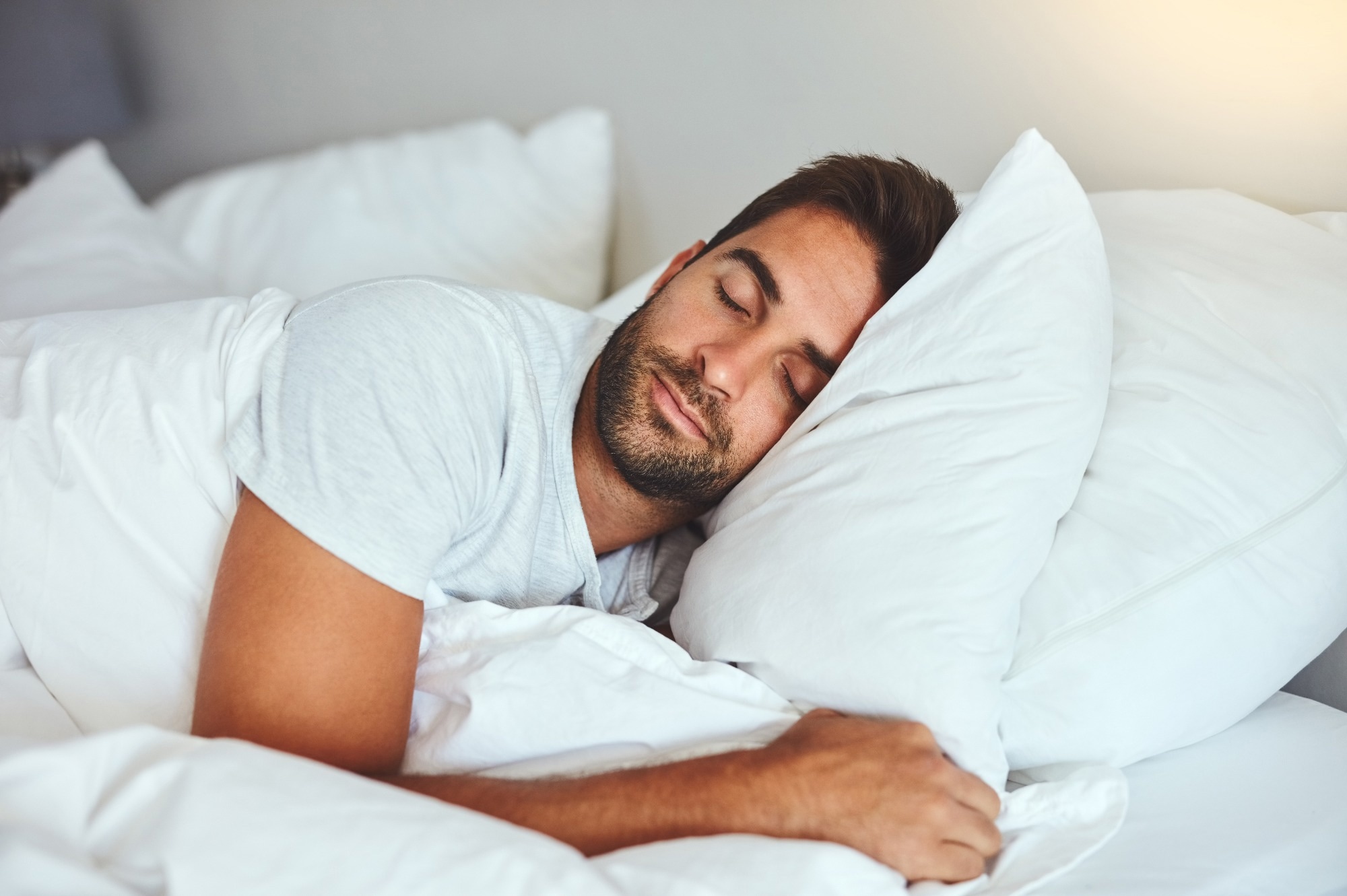The study found that pre-existing sleep disturbances elevated the risk of susceptibility to COVID-19, as well as hospitalization, mortality, and long COVID, with age and sex playing a role.
 Study: Pre-existing sleep disturbances and risk of COVID-19: a meta-analysis. Image Credit: PeopleImages.com - Yuri A/Shutterstock.com
Study: Pre-existing sleep disturbances and risk of COVID-19: a meta-analysis. Image Credit: PeopleImages.com - Yuri A/Shutterstock.com
Background
The COVID-19 pandemic has caused significant global morbidity and mortality, with long COVID emerging as a major concern, affecting at least 65 million people worldwide.
Long COVID encompasses a range of symptoms and new-onset diseases, posing ongoing health and economic burdens. Sleep disturbances, such as insomnia and obstructive sleep apnea (OSA), were prevalent during the pandemic, affecting 40.49% of the global population. These disturbances are known to be linked to immune deficiency and inflammation, exacerbating the impact of COVID-19.
While previous studies have shown that OSA increases the severity and mortality of COVID-19, other sleep disturbances and their role in long COVID remain less explored.
Conflicting evidence exists regarding the relationship between sleep disturbances and long COVID, with some studies indicating a positive association between conditions like OSA and insomnia, while others find no significant link.
Comprehensive research is needed to understand these connections and effectively address long COVID. Therefore, researchers in the present meta-analysis aimed to examine the effect of pre-existing sleep disturbances on COVID-19 outcomes.
About the study
A total of 48 relevant observational studies with 8,664,026 participants were included from databases including Web of Science, PubMed, and Embase. The studies investigated COVID-19 susceptibility (22), hospitalization (12), mortality (16), and long COVID (11).
Case reports, brief communications, letters, reviews, and preprints were excluded. Most studies were conducted in the United States of America, and up to 72% of the participants were male. The studies focused on four sleep disturbances: OSA, insomnia, abnormal sleep duration, and night-shift work.
Two researchers extracted and assessed data. They collected basic information (author, year, study design, region, sample size, age, gender), types of sleep disturbances, and COVID-19 outcomes.
Odds ratios (ORs) were calculated from available data or other ratios if necessary. Quality was evaluated using the Agency for Healthcare Research and Quality for cross-sectional studies and the Newcastle–Ottawa Scale for cohort/case-control studies.
Statistical methods included pooled ORs, heterogeneity assessment, subgroup analysis, sensitivity analyses, Egger's test, and the trim-and-fill method for publication bias evaluation.
Results and discussion
Participants with pre-existing sleep disturbances were more susceptible to COVID-19 (OR = 1.12). Specific disturbances like OSA, abnormal sleep duration, and night shift work also increased COVID-19 occurrence.
Higher susceptibility was found in low- and middle-income countries compared to high-income countries and in studies with unadjusted ORs. Younger individuals with sleep disturbances showed increased susceptibility (OR = 1.20), while older individuals did not.
Further, patients with pre-existing sleep disturbances had a higher risk of COVID-19 hospitalization (OR = 1.25), with all sleep disturbances except insomnia contributing to this increased risk. The association was stronger in patients younger than 60 years.
Pre-existing sleep disturbances were also found to increase COVID-19 mortality (OR = 1.45), mainly due to OSA. This risk was higher in older patients and males. Diabetes was found to be a significant source of heterogeneity, with a stronger association between sleep disturbances and COVID-19 mortality in diabetic patients as compared to the general population.
Moreover, pre-existing sleep disturbances significantly increased the risk of developing long COVID (OR = 1.36). The association was stronger for long COVID defined as symptoms lasting ≥3 months compared to ≥1 month.
Subgroup analysis confirmed that OSA increased long COVID risk in both definitions (3-month: OR = 1.75, 1-month: OR = 1.12). Therefore, OSA may be a potential risk factor for long COVID, but further research is warranted to confirm these findings.
Asymmetric funnel plots indicated potential publication bias for COVID-19 susceptibility, hospitalization, and mortality studies. Subgroup and sensitivity analyses aligned with the main findings, confirming the robustness of the study.
The study highlights the importance of addressing sleep disturbances in COVID-19 management and prevention strategies. It is the first meta-analysis to investigate the impact of all sleep disturbances (not only OSA) on the total clinical course of COVID-19. However, the study is limited by high heterogeneity among outcomes, the observational nature of all included studies, and the inability to confirm causal relationships.
Conclusion
In conclusion, sleep disturbances, particularly OSA, significantly heightened the risks of COVID-19 susceptibility, hospitalization, death, and long COVID, with these effects influenced by age and gender.
Therefore, the study urges healthcare professionals to conduct early examinations and timely intervention for patients with sleep disturbances to alleviate the immediate and long-term impact of COVID-19.